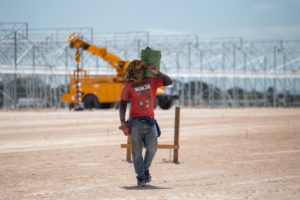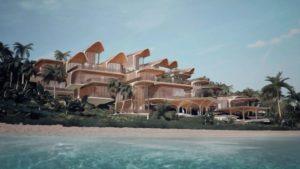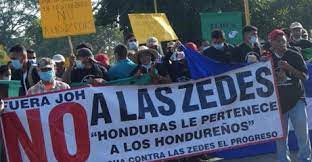By Jim Phillips
Since the election of the new Honduran government of Xiomara Castro last November, the urgent question has been whether and how her government, committed as it is to dismantling the corruption, violence, and impunity of the previous government, can actually make the transition to an economy and a politics that will serve the Honduran people and local communities, and regain some control over the country’s resources and sovereignty, rather than merely enriching corporations and foreign interests. Honduras is now a real test case of whether a well-intentioned Latin American government can control the overwhelming power of the globalized economy in order to deliver a better life for ordinary people. For Hondurans, the most telling symbol of the complexity of the challenge are the ZEDEs, the so-called Zones of Employment and Economic Development or “special economic development zones.”
The ZEDEs are an adaptation of the “charter cities” or model cities idea. The concept has been marketed as a way to introduce an engine of prosperity into countries suffering serious economic and social crises. The model envisions zones of territory or enclaves where foreign investment is welcomed to create businesses and projects free from most of the taxes, restrictions, rules, policing, courts, and governance of the host country—essentially a foreign enclave with its own rules and structures operating within a country like Honduras.
Such model cities are similar in ways to free trade zones, but they are subject to even less control and oversight by the countries where they operate. A report from the Center for International Environmental Law points out that, “while free trade zones exist elsewhere in Latin America, the ZEDE law [in Honduras] envisions a more radical model, one that gives broad powers to a small group of unelected officials who run the zones with little official oversight or mechanisms for accountability.” Essentially, model cities would be independent entities tied to and responsible to the global market economy, not to the government or the people of the host country.

Model cities represent one of the more extreme examples of a neoliberal globalized world order. Anthropologist Beth Geglia, who has studied the ZEDEs in Honduras, says that the law enabling them, “fundamentally changes the relationship between citizens and the state, especially for Indigenous communities.” The state gives up much of its responsibility to govern and to be governed by the people, essentially turning its citizens into subjects of foreign interests. This raises basic issues of national sovereignty, local autonomy, democratic participation, and more.
In 2010, shortly after the coup that deposed Honduran President Manuel Zelaya, leaders of the coup—in particular Juan Orlando Hernandez who was then head of the Congress and later became President—began moving forward with plans to invite a model cities development on the north (Caribbean) coast of the country. That area was the location of dozens of Garifuna Indigenous communities, but the promoters of the model city project portrayed it as an area devoid of significant population. The Garifuna were not consulted as the government developed plans for a model city in their territory. This mentality—ignoring or erasing the presence of Indigenous people—is an old trick useful for stealing Indigenous lands throughout the Americas.

In 2011, the post-coup Honduran government passed laws enabling the establishment of “special development regions,” (regiones especiales de desarrollo, REDs) paving the way for the introduction of model cities in Honduras. The promoters of model city development said it would help reverse the country’s chronic debt and unemployment by creating thousands of jobs and stimulating more investment in the country. Each “special development zone” could develop however its investors decided. A “best practices committee” was set up to oversee plans for developing model cities in Honduras. The committee included Michael Reagan (son of Ronald Reagan) and Grover Norquist, a prominent U.S. conservative and opponent of Central American immigration. They saw model cities as good for U.S. corporate interests and as a means to reduce “illegal” immigration to the U.S.
But some Hondurans labeled as traitors the members of the Honduran Congress who passed the legislation creating the REDs that facilitated the location of model cities. Xiomara Castro (today the current Honduran President) said the move was so sweeping that it should be brought to the people in a referendum. Berta Cáceres—leader of the Lenca Indigenous organization COPINH who was later killed for her defense of Lenca land and environment—said on COPINH’s website: “A model city in a society in tatters is a contradiction.” A group of lawyers including the country’s Attorney General brought a formal complaint to the Honduran Supreme Constitutional Court, arguing that the legislation enabling “special development regions” and the whole model cities concept violated the country’s sovereignty and various rights of the Honduran people.
In November, 2012, the Court, by a four to one decision, declared the legislation unconstitutional and invalid. The Congress then summarily deposed four of the five judges who had issued the judgment, replacing them with others who duly declared that the law permitting REDs was constitutional. This illegal removal of sitting Constitutional Court judges was condemned by many Hondurans, including prominent legal scholars, and became known as the “technical coup.” After this, the plan for model cities stalled for several years because some of its major foreign backers and investors claimed the Honduran government was trying to exercise too much control over the development.
When Juan Orland Hernandez assumed the Honduran presidency in early 2014, plans for model cities in Honduras were revived. Congress passed more laws to enable the creation of ZEDEs. In the next five years, foreign investors created the three ZEDEs that currently exist in Honduras: Ciudad Morazan, located in the important commercial department of Cortez; Orquidea, located on the northern Caribbean coast; and Prospera, located on Roatan in the Bay Islands off the northern coast of Honduras. Each of these names was chosen deliberately to evoke good feelings—Francisco Morazan, one of the founders of modern Honduras; Orquidea, the orchid, the national flower of Honduras; and Prospera, prosperous, thriving. Each of these focused on a different kind of economic base: manufacturing, agriculture, high tech. They included plans for housing for a limited number of workers, offices and workshops. By late 2021, all of these were still works in progress. A report by the Center for International Environmental Law points out that, “while ZEDEs have been referred to as model cities or employment zones, the terminology can be misleading. A ZEDE has no size specifications; it could be a single African palm project in rural Honduras, an urban factory or call center, an industrial zone, or a large-scale tourism zone stretching across multiple existing municipalities.”

But criticisms and protest against ZEDEs was growing in Honduras, and it continues today. In the small fishing community of Crawfish Rock located on Roatan Island next to the Prospera ZEDE, people say they were given no voice in the decision to locate Prospera there. They worry about a provision in the law that allows the ZEDE to expropriate community land, and possibly the entire community. Some say they were threatened to sell their land to the ZEDE or risk expropriation. Local people complain that the Prospera ZEDE has so far not created the local jobs it promised. They worry that their entire way of life and the local culture of their community will be changed by the overwhelming presence of the Prospera ZEDE. They complain that neither the foreign developers nor the Honduran government consulted them adequately or told them what they needed to know before starting the project. At the other ZEDE locations, people raise similar complaints. Fundamental concerns have been the loss of local autonomy over daily life in one’s community, and the loss of national sovereignty that the ZEDES represent for many Hondurans—a further handing over of national territory and resources to foreign interests.
Criticism has also come from unexpected sources. The Honduran Private Enterprise Council (COHEP), an organization promoting major business interests, has complained that the ZEDEs have unfair advantages. Honduran businesses pay taxes and fees, and are subject to certain regulations, while the ZEDEs are freed from paying most taxes and restrictions. COHEP also expressed concern that the ZEDEs could become zones for illegal activity that might be detrimental to legal businesses and the country. The United Nations Human Rights representative in Honduras has said that the ZEDEs, “could mean serious risks to compliance with the general obligations of the Honduran state to respect and guarantee the free and full exercise of the rights of all residents without discrimination.”
In the national election of November 2021, Hondurans decisively chose Xiomara Castro as President, and other candidates who promised major change away from the policies of the Hernandez government. For many Hondurans, one of the most important and discussed) campaign issues was the fate of the ZEDEs. For many Hondurans, the issue was whether the country could shift away from the kind of foreign controlled extractive “development” that does little for most Hondurans, moving instead to an economic model that favors local communities and local enterprise.
After taking office in January of this year, the Honduran Congress approved the repeal of the laws that permitted ZEDEs. This was hailed as a first major step toward closing the current ZEDEs and banning further ones, and it was celebrated by many Hondurans. But there are powerful interests defending the ZEDEs. Some Hondurans—seemingly a minority—still see the ZEDEs as a promise of employment and prosperity. The investors and promoters of the current ZEDEs, along with their allies in the Honduran Congress, have threatened to take legal action to demand that the new government honor the contracts made with them by the previous Hernandez government. Some Honduran politicians allegedly received handsome payments for enabling the ZEDEs and approving the contracts. ZEDE supporters, both Honduran and foreign, have threatened that banning the ZEDEs would violate global trade laws and subject Honduras to sanctions by the World Trade Organization (WTO). How the United States will intervene in this matter and how these legal challenges will fare remains to be seen.
The story of the ZEDEs in Honduras may be a cautionary tale. Governments that try to refashion their political economy to benefit their people are likely to face punishment for attempting that. The model city and ZEDE creation also seemed to function on the assumption that the experts from the developed countries know best how to “fix” the “developing” countries. Many Hondurans are not so sure about that. The ZEDE model as it was envisioned in Honduras implied that, in the current global economy, economic “development” necessitates inequality and less democracy—a belief shared by various prominent political and financial figures in the United States and elsewhere. The same interests that want a disembodied enclave anywhere they can to make profit are not to be trusted anywhere. A cautionary tale for all of us.


